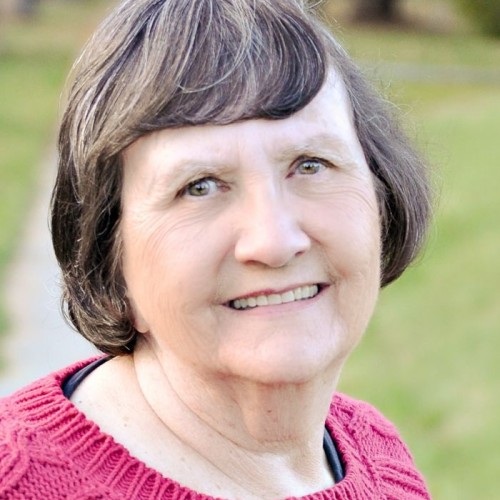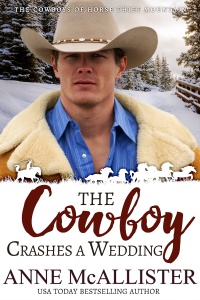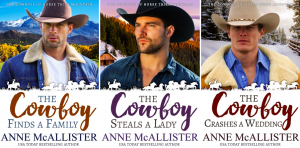Anne McAllister stopped by the Tule blog to discuss the third book in her Cowboys of Horse Thief Mountain series, The Cowboy Crashes a Wedding!
Hi, Thanks for asking me to share the answers to some questions about The Cowboy Crashes a Wedding. It was a different sort of book to write because it began with the same scene – from Cash’s point of view – that occurred at the beginning of Shane’s book, The Cowboy Steals a Lady. But while Shane’s book mostly went straight on from there (with a bit of a flashback to the chicken), The Cowboy Crashes a Wedding skipped back to take in basically the whole of Milly and Cash’s five-year-long relationship.
Most short contemporary romances focus on a much more limited time-frame – and rightly so – but I couldn’t do justice to Cash and Milly’s story if I didn’t take readers back to let them see the whole thing play out. So I did. It was an interesting experience!
Where did you get the inspiration for The Cowboy Crashes a Wedding?
The book, of course, got its start from The Cowboy Steals a Lady, and that book — about Shane and Poppy — really did come first, even though it happened because of Cash and Milly’s relationship. Writers’ minds are weird that way. They certainly don’t progress in a linear fashion.
But in The Cowboy Crashes a Wedding I wanted to look at a guy who has spent his entire adult life focusing on one thing – his career in rodeo – and then, suddenly, finds himself confronting new priorities. It’s not an unusual scenario, really. A lot of men – and women — who are driven to succeed in a particularly demanding intense job commit themselves to that one thing. In Cash’s case, as is generally what happens with professional athletes, their career span is necessarily short, so focus is imperative, and they expect everything – and everyone – else to take a back seat.
When, after nearly five years, Milly decides he’s never going to change and she wants a relationship with more than the back seat, she finds a man to share it with. And Cash has a wake-up call.
How is Cash different from your other Horse Thief Mountain heroes, Mace and Shane?
Cash is much more driven than Shane when it comes to his career. Shane rodeos for fun, for excitement, simply because he likes it. It’s demanding, sure, and it’s hard, but there’s always something new. Shane would like anything with a lot of variety and a lot of people to be with. He’s a people person, full stop. Cash is much more focused on his career, his success. He likes pitting himself against the challenge of riding a particular bronc. He wants to be the best. It feeds a fierce competitiveness in him that Shane doesn’t feel. Mace isn’t like either of them. He, of course, has no desire to go down the road. He doesn’t want new. He doesn’t want excitement. He wants to ranch, to settle in, to plant roots. He’s as determined as Cash, but his focus isn’t the same at all. He know exactly what he wants – which is why he’s devastated when he can’t have it. Mace made a commitment to Jenny – and to their dreams – at a very young age, and when her dreams shatters on account of him, he’s rocked to the core. Neither Shane nor Cash ever felt that depth of commitment so early in their lives. Before they had to man up in their books, neither Shane nor Cash had ever put another person first.
Where and when do you get most of your writing done?
I have always done what I call “the hummingbird approach to writing.” That means I get up in the morning, turn on the computer, brush my teeth, open the current file, read the last sentence I wrote, write another, put the dogs out, put the kettle on for tea, go back to the computer, write a few more sentences, cut some that I’ve already written, tighten things up, make the tea, let the dogs in, write another few sentences, sort the laundry, write some more, think a while, feed the dogs, write a bit more. You get the idea. I rarely sat still for longer than ten minutes at a time. When my kids were young, I used to try to get more done before they got home from school, but it rarely worked out that way. Almost always I was just getting my head fully into the day’s writing when someone would bang in the door shouting something about school or baseball or bikes, and I’d have to hang onto the thought in the book while I coped with ‘real life.’ Even now that the kids are grown and have kids of their own, I have grandkids who (bless their hearts!) turn up at the door, and the fictional characters get put on hold until the next time I can find two minutes to let them out to play again.
How do you relate to Milly, your heroine, and how do you hope readers will relate to her?
I shared Milly’s frustration with Cash’s inability to get a broader perspective on life. I married an English professor who was every bit as focused on his classes and his writing as Cash was on his broncs. I wasn’t as long-suffering as Milly, though, and if my guy hadn’t popped the question pretty quick – we’d known each other five months when he did – I doubt I’d have hung around. I wouldn’t have made a good a heroine as Milly, I fear. But I did understand how to bring Cash up to snuff – it just took him longer.
How do you relate to Cash?
Like I said, I understood Cash. He was my hero – without the tweed jackets and elbow patches. And when he did recognize what his real long-term priorities were, I knew he’d be as good at them as my Prof is. Those men can focus!
What are you currently reading?
I’m reading three or four things (I use the hummingbird approach to reading, too!). I’m reading Jeffrey Siger’s latest Andreas Kaldis mystery, called A Deadly Twist. I’ve read every one of those and really enjoy them, particularly now since getting to Greece isn’t a current option. I’m re-reading Lucy Score’s By a Thread, which is the first book of hers that I read, and I loved it and so I’ve read a lot of the others, but I keep coming back to that one because I felt she did justice to workplace romances in changing times so very very well (and it’s just a fun read). I’m almost finished with Lisa Wingate’s The Book of Lost Friends, which I am loving for both its past and nearly-present story threads. And, finally, I am reading – in fits and starts, Ian Mortimer’s The Time Traveller’s Guide to Restoration Britain, because my other hat is that of a professional genealogist and family historian, and I’m currently working on three different cases set during the Restoration. It makes a change from cowboys! But I do love both.
About the Author









By posting a comment, you consent to have your personally identifiable information collected and used in accordance with our privacy policy.